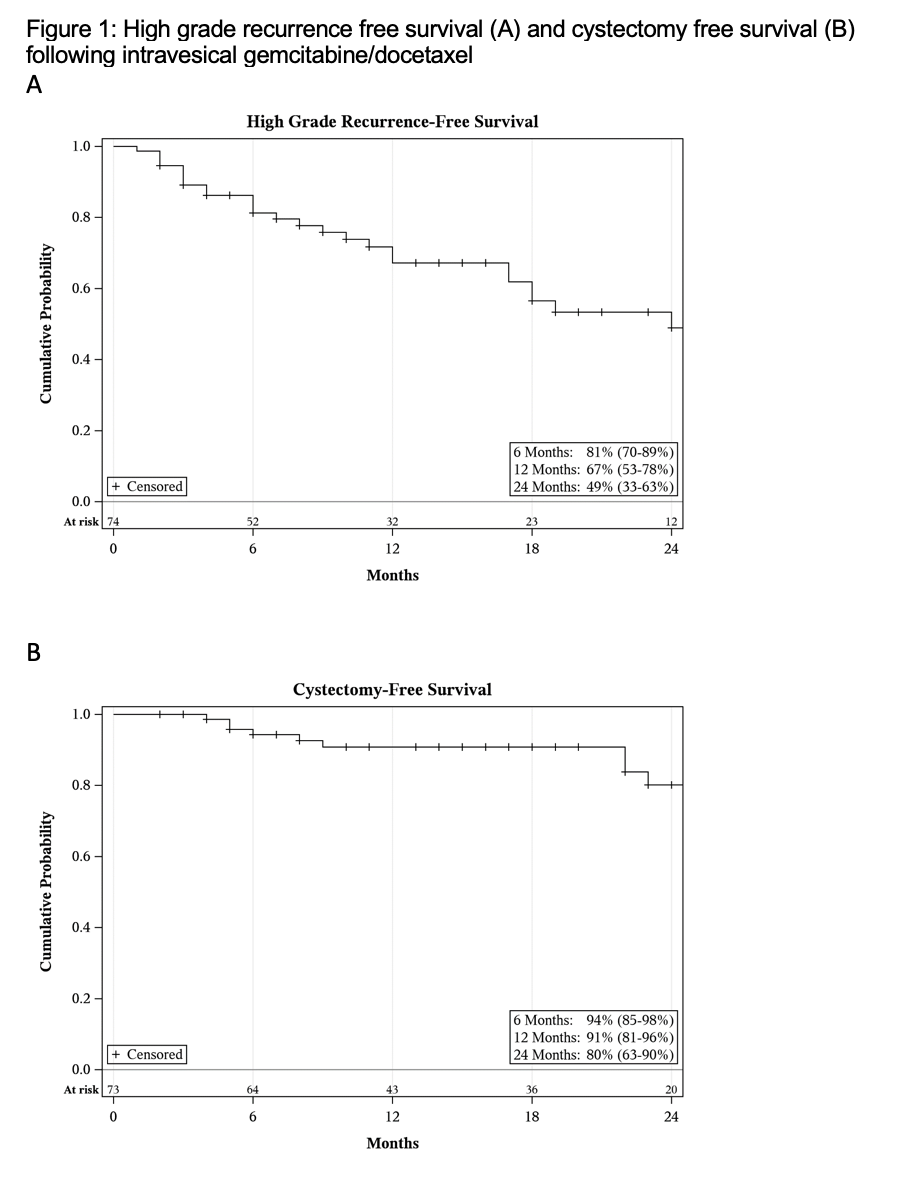Back
Poster, Podium & Video Sessions
Moderated Poster
MP54: Bladder Cancer: Non-invasive II
MP54-14: Sequential intravesical gemcitabine/docetaxel provides a durable remission in recurrent high risk NMIBC following BCG therapy
Monday, May 16, 2022
8:45 AM – 10:00 AM
Location: Room 228
Kendrick Yim, Kevin Melnick*, Boston, MA, Sarah L Mott, Iowa City , IA, Vani Gupta, Timothy N Clinton, Filipe LF Carvalho, Matthew Mossanen, Graeme S Steele, Kent Mouw, Boston, MA, Michael A O'Donnell, Iowa City , IA, Mark A Preston, Boston, MA
- KM
Kevin R. Melnick, II, MD
Brigham and Women's Hospital
Poster Presenter(s)
Introduction: Bacillus Calmette-Guerin (BCG) is the standard of care for high risk non-muscle invasive bladder cancer (NMIBC), but half of patients eventually fail BCG and radical cystectomy (RC) remains the alternative with best oncologic outcomes. However, RC is morbid surgery; many patients are poor surgical candidates and desire bladder-sparing alternatives. Intravesical regimens for BCG unresponsive NMIBC are limited. We report the safety and durable efficacy of sequential gemcitabine/docetaxel (gem/doce) in high risk NMIBC after BCG failure.
Methods: Single institution retrospective analysis of patients treated with induction intravesical gem/doce (=5/6 instillations) for high risk NMIBC from May 2018 to May 2021. BCG failures were grouped as BCG unresponsive, intolerant or early relapsing. Maintenance therapy was provided to patients without evidence of high grade (HG) recurrence on surveillance cystoscopy per physician preference. Kaplan-Meier curves were generated to estimate survival probabilities.
Results: Seventy-four patients were included in this study (median age 72.0, median follow-up 18 months). Six-, 12, and 24-month HG recurrence free survival rates (RFS) were 81%, 67%, and 49% respectively (Figure 1A). Four patients experienced disease progression on transurethral resection. Fourteen patients underwent radical cystectomy (median 22 months from induction) (Figure 1B), with only 4 patients progressing to muscle invasion. Forty-eight (65%) patients experienced mild to moderate grade adverse effects (AE), but only 7% experienced a delay in treatment schedule. Most common AE were urinary frequency/urgency in 36 (49%) and dysuria in 12 (16%).
Conclusions: In an independent study of high-risk BCG failures, sequential intravesical gem/doce appears to be an effective and well tolerated alternative to early cystectomy, validating prior reports of its utility. A prospective trial is warranted to better characterize efficacy and compare to other intravesical therapies.
Source of Funding: None

Methods: Single institution retrospective analysis of patients treated with induction intravesical gem/doce (=5/6 instillations) for high risk NMIBC from May 2018 to May 2021. BCG failures were grouped as BCG unresponsive, intolerant or early relapsing. Maintenance therapy was provided to patients without evidence of high grade (HG) recurrence on surveillance cystoscopy per physician preference. Kaplan-Meier curves were generated to estimate survival probabilities.
Results: Seventy-four patients were included in this study (median age 72.0, median follow-up 18 months). Six-, 12, and 24-month HG recurrence free survival rates (RFS) were 81%, 67%, and 49% respectively (Figure 1A). Four patients experienced disease progression on transurethral resection. Fourteen patients underwent radical cystectomy (median 22 months from induction) (Figure 1B), with only 4 patients progressing to muscle invasion. Forty-eight (65%) patients experienced mild to moderate grade adverse effects (AE), but only 7% experienced a delay in treatment schedule. Most common AE were urinary frequency/urgency in 36 (49%) and dysuria in 12 (16%).
Conclusions: In an independent study of high-risk BCG failures, sequential intravesical gem/doce appears to be an effective and well tolerated alternative to early cystectomy, validating prior reports of its utility. A prospective trial is warranted to better characterize efficacy and compare to other intravesical therapies.
Source of Funding: None


.jpg)
.jpg)